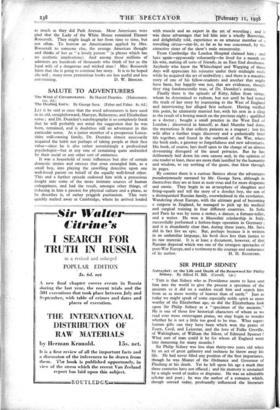SALUTE TO ADVENTURERS
The Healing Knife. By George Sava. (Faber and Faber. Ss. 6d.)
LET it be said at once that the word adventurers is here used in its old, straightforward, Marryat, Ballantyne, and Elizabethan sense ; and Dr. Dearden's autobiography is so completely frank that he will probably not mind the suggestion- that he was born, remained, and is doubtless still an adventurer in this particular sense. As a junior member of a prosperous Lanca- shire mill-owning family, Dr. Dearden almost necessarily acquired the habit not perhaps of taking people at their face value—since he is also rather astonishingly a professional psychologist—but at any rate of remaining quite undazzled by their social or any other sort of eminence.
It was a household of tonic influences but also of certain domestic strains and stresses that even entangled him, as a small boy, into playing the unwilling detective upon one well-loved parent on behalf of the equally well-loved other. This and a further episode endowed him with a precocious insight into some of the more intimate sources of human unhappiness, and had the result, amongst other things, of inducing in him a passion for physical culture and a phase, as he describes it, of rather priggish puritanism. This very quickly melted away at Cambridge, where he arrived loaded
with muscle and an expert in the art of wrestling ; and it ''was these advantages that led- him into a wholly Bdrrovian, and delightfully told, experience as an amateur member of a travelling circus—star-lit, as far as he was concerned, by the attractive sister of the show's male monstrosity.
From Cambridge the London Hospital claimed him ; and here again—apparently voluntarily—he lived for a month on his wits, making all sorts of friends, in an East End dosshouse. Anybody who knew the Whitechapel and Wapping of those days will appreciate his sojourns under their midnight roofs while he acquired the art of midwifery ; and there is a macabre story of one of his fellow-students and another that might have -been, but happily was not, that are evidences, though they ring fundamentally true, of Dr. Dearden's artistry.
Finally there is the episode of Kitty, fallen from virtue, whom he determined to redeem, but not until he had tested the truth of her story by journeying to the West of England and interviewing her alleged first seducer. Having verified this point, he ultimately married her, with his arm in a sling as the result of a boxing match on the previous night ; qualified as a doctor ; bought a small practice in the West End of London ; discovered in himself, as Axel Munthe had done, the mysterious It that collects patients as a magnet ; lost his wife after a further tragic discovery and a pathetically brief life together, and found in the outbreak of the War, where the book ends, a gateway to forgetfulness and new adventures. His book, of course, lays itself open to the charge of an almost devastating disregard of the usual privacies. But he has deliberately laid down his own canons and, in the opinion of one reader at least, these are more than justified by the humanity and wisdom, to say nothing of the gusto, that blow through its pages.
By contrast there is a curious flatness about the adventures pseudonymously narrated by Mr. George Sava, although in themselves they are at least as nunr.rous and far more desperate and exotic. They begin in' an atmosphere of slaughter and firing-squads and tell the story of a derelict boy, the son of a distinguished Russian family, overwhelmed in the revolution. Wandering about Europe, with the ultimate goal of becoming a surgeon in England, he managed to pick up his medical and surgical training in four different countries. In Sofia and Paris he was by turns a stoker, a dancer, a fortune-teller, and a waiter. He won a Mussolini scholarship in Italy, successfully performed a forlorn-hope operation in Germany ; and it is abundantly clear that, during these years, Mr. Sava did in fact live an epic. But, perhaps because it is written in an unfamiliar language, his book does less than justice to its raw material. It is at least a document, however, of that Russian dispersal which was one of the strangest spectacles of post-War Europe, and a testimony to the courage and endurance


















































 Previous page
Previous page